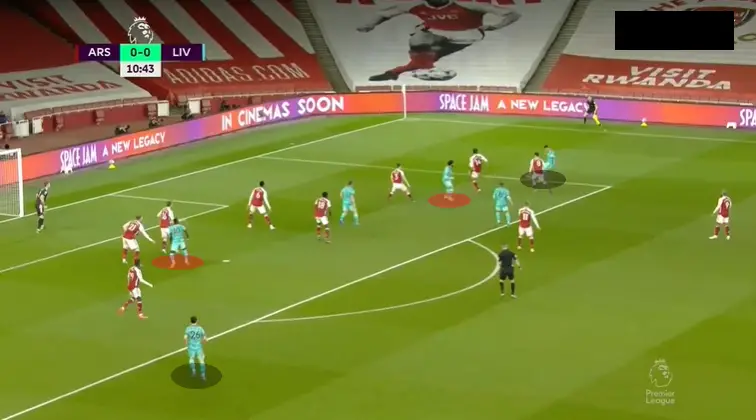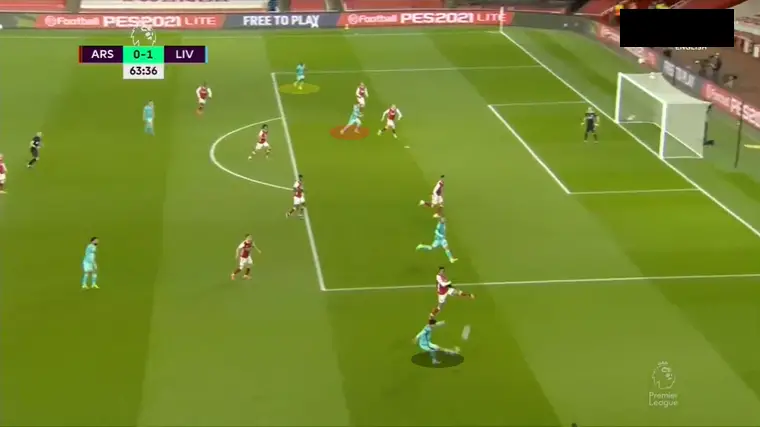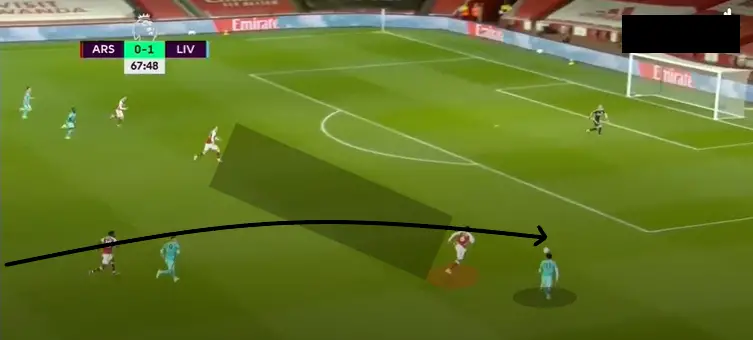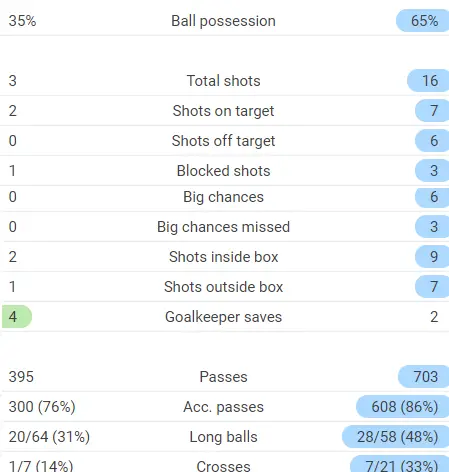The outcome – a big win
Liverpool and Arsenal met in a classic Premier League encounter on Saturday, 3rd April 2021. Their games have been goal-laden in the past and there were similar expectations this time around as well. The Reds are chasing a top-4 finish after capitulating mid-season while Arsenal seemed like they do not really have anything to play for after a poor season so far.
And it showed on the field. Liverpool ran out dominant winners as they were in control of the game throughout and never once looked like letting Arsenal get the three points. We will now chronologically see how the Reds managed this massive 3-0 away win and scored more than two goals for the first time in 11 games.
Setting up in the familiar way
There was nothing extraordinary from Liverpool. Jurgen Klopp fielded his trusted 4-3-3 formation with the usual trio of Roberto Firmino, Sadio Mane, and Mohamed Salah in the front three. Thiago, James Milner, and Fabinho made up a midfield trio. Arsenal, too, stuck with their tried and tested 4-2-3-1 that they have come to use so frequently under Mikel Arteta.
And as expected, the teams were assuming positions in the game that they were largely expected to do. Liverpool’s full-backs were more advanced and played further up the field. The midfield three remained in their positions, while Firmino played deep to make Mohamed Salah and Sadio Mane the two most advanced Liverpool players. This is evident in their average positions in Image A.

The bombing full-backs
Liverpool’s full-backs are their main source of creation and threat. Image B shows how Trent Alexander-Arnold and Andrew Robertson are the top 3 creators for the Reds in the Premier League this season when it comes to xA (expected assists).

This is why it was expected that the two would be involved in a big sense when it came to Liverpool’s attack. And that was the case as well. Image C makes it evident that the two of them were almost always in the Arsenal half, while also not abandoning their defensive duties altogether.

Image D now shows just how forward the Scotsman and Englishman (both black circles) were when Liverpool were attacking. They often became the sole outlet on the wings, with Mane and Salah (red circles) both tucking in to become inside forwards.

The stalemate
The match went more than an hour without a goal. But Liverpool were absolutely dominating every area of the match. Image E shows the statistics of the game for the first hour of the game. Liverpool had more shots, more possession, and negated Arsenal completely on the attacking front.

But Liverpool kept attacking a lot and nothing came of it. Arsenal were pushed back and the Reds looked like they will be the next team to score. However, they were wasteful and the score remained 0-0 for a large part of the second half as well. Now was the time to change things, and things did change.
Manegerial masterclass
Jurgen Klopp was on hand to make one crucial, game-changing decision as he took off Robertson in the 61st minute. He brought on the in-form Diogo Jota who recently returned from injury. He could have made it a straight swap with any of the Liverpool front three, but he opted to add Jota to the attacking trio.
This meant a formation change. Liverpool were now playing in a 4-2-3-1 (Image F) where Jota was the striker, Firmino was the No.10, and James Milner dropped to left-back.
The formation changed, at least on paper, in the 78th minute when Firmino was replaced by Georginio Wijnaldum to make a midfield-three again. But by then, Liverpool had already scored 2 goals and were well on their way to win the match.

The interchanging attack
And this is where the game changed. We have talked about Jota’s desire to interchange as a left-winger and a striker, and this is exactly what he did against the Gunners too. The Portuguese flourished in a similar role for Portugal where he scored a brace against Serbia.
And hints of that performance were here as well. He came on as a striker but was consistently interchanging his position with Sadio Mane on the left-hand side. The Senegalese was sometimes on the wing, and other times, he was playing centrally, with Jota making runs inside the box from the left-hand side.
This is most evident in the following instances. Image G shows Jota’s run inside the box (red circle) where he is clearly playing as a centre-forward. Mane (yellow circle) is on the left-hand side, whereas Alexander-Arnold (black circle), as we have discussed above, is bombing down the flanks.

The cross found Jota’s head and the Portuguese, who is surprisingly too good with headers despite being just 1.78m tall, scored to make it 1-0. A great little statement made by the English full-back to Gareth Southgate as well after the Three Lions boss did not call him up during this international break.
The third goal in Image H shows Jota’s interchange with Mane. The former Wolves forward (yellow circle) is now playing on the left and making a run inside the box. Mane (black circle) has assumed the role of a centre-forward.
This mix-and-match play confused Arsenal who were really always lacking when it came to picking up their men. When players change positions like this, it becomes difficult for the opposition to pin them down with just one defender because the defender then risks being sucked out of position.

Defensive disasterclass
The defending from Arsenal was laughable at times. The first goal saw them allow the cross from Alexander-Arnold to come in and let a 1.78m-tall forward beat them in the air. The second goal was the one where their lazy defending and lack of defensive awareness were at full display.
Image I displays the area between their two centre-backs. The left-back is nowhere to be seen. Salah beats Gabriel (red circle), and once the Brazilian is beaten, there is no one to close Salah down as the other Arsenal defenders are far removed from the play. The Egyptian slots the ball in from four yards out between the legs of the onrushing Bernd Leno.

It is also laughable that Arsenal were passing out from the back when 2-0 down when they knew Liverpool were pressing a lot. Image J clearly shows that the Reds’ PPDA (passes per defensive action). It means that Liverpool players were making a defensive action every 7.5 passes that Arsenal made as compared to the Gunners’ 19.52.

It cost them big time as they lost the ball high up the pitch when Trent Alexander-Arnold intercepted the ball and a quick counter-attack there meant 3-0 to Liverpool. Arsenal’s poor PPDA is also to blame for the fact that they let Liverpool pass, build up from the back, and dominate the game in possession.
It was always an uphill task for Arsenal from there when they raised their hands and allowed the away side to play like the home team.
Verdict
It was an amazing display for Liverpool, but they were helped in part by how bad Arsenal were. The Gunners trailed the Reds in every important statistic (Image K), whereby they were dominated in possession, in attack, and in defence. They mustered just 3 shots in total in comparison to Liverpool’s 16 and only kept the ball for about 1/3rd of the game.

And Jota was on the scoresheet again as he looks like the one player who can salvage the Reds’ season. His return from injury has come just in time and Liverpool would be hoping he is their man to carry them to a top-4 finish this season.

